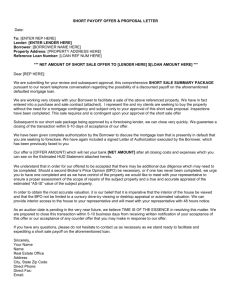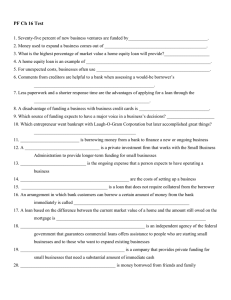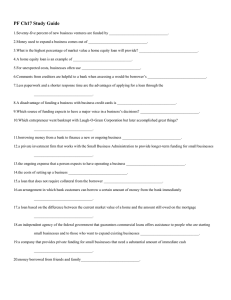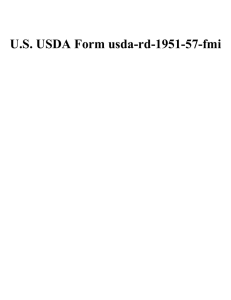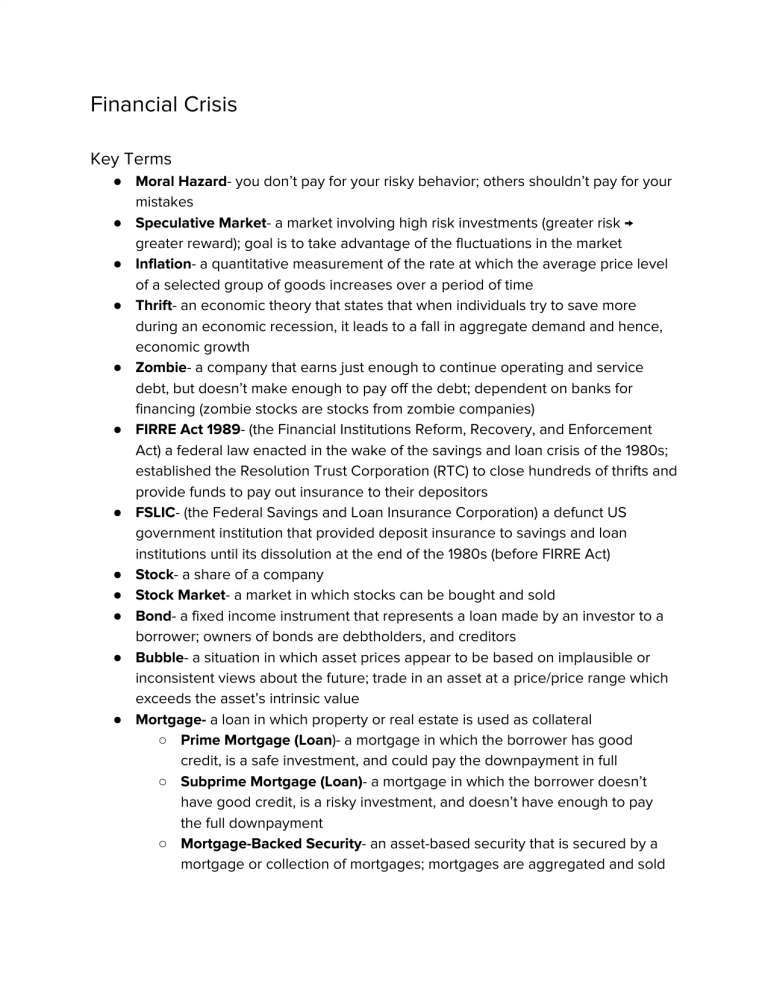
Financial Crisis Key Terms ● Moral Hazard- you don’t pay for your risky behavior; others shouldn’t pay for your mistakes ● Speculative Market- a market involving high risk investments (greater risk → greater reward); goal is to take advantage of the fluctuations in the market ● Inflation- a quantitative measurement of the rate at which the average price level of a selected group of goods increases over a period of time ● Thrift- an economic theory that states that when individuals try to save more during an economic recession, it leads to a fall in aggregate demand and hence, economic growth ● Zombie- a company that earns just enough to continue operating and service debt, but doesn’t make enough to pay off the debt; dependent on banks for financing (zombie stocks are stocks from zombie companies) ● FIRRE Act 1989- (the Financial Institutions Reform, Recovery, and Enforcement Act) a federal law enacted in the wake of the savings and loan crisis of the 1980s; established the Resolution Trust Corporation (RTC) to close hundreds of thrifts and provide funds to pay out insurance to their depositors ● FSLIC- (the Federal Savings and Loan Insurance Corporation) a defunct US government institution that provided deposit insurance to savings and loan institutions until its dissolution at the end of the 1980s (before FIRRE Act) ● Stock- a share of a company ● Stock Market- a market in which stocks can be bought and sold ● Bond- a fixed income instrument that represents a loan made by an investor to a borrower; owners of bonds are debtholders, and creditors ● Bubble- a situation in which asset prices appear to be based on implausible or inconsistent views about the future; trade in an asset at a price/price range which exceeds the asset’s intrinsic value ● Mortgage- a loan in which property or real estate is used as collateral ○ Prime Mortgage (Loan)- a mortgage in which the borrower has good credit, is a safe investment, and could pay the downpayment in full ○ Subprime Mortgage (Loan)- a mortgage in which the borrower doesn’t have good credit, is a risky investment, and doesn’t have enough to pay the full downpayment ○ Mortgage-Backed Security- an asset-based security that is secured by a mortgage or collection of mortgages; mortgages are aggregated and sold ● ● ● ● ● ● ● ● ● ● ● ● ● ● ● to a group of individuals who securitizes the loans together for investors to buy FICO Score- (aka credit score; Fair Isaac and Company) a measure of consumer credit risk (0-800) Credit- an agreement between a borrower and a lender that the borrower will pay back the lender at a later date, with interest APR- (annual percentage rate) the annual rate charged for borrowing or earned through an investment Financial System- a system that allows for an exchange of funds between lenders, borrowers and investors ○ The job of the financial system is to reduce financial problems and enhance efficiency or financial markets (protect against uncertainty) ○ Transaction Costs ○ Risk ○ Liquidity- breaking down (liquidize); liquid money=money available Glass-Steagall Act 1933- passed after Great Depression to prevent deregulation (nullified) Federal Reserve Act 1913- created the central banking system of the US NINA Loan- (no income/no asset) a mortgage that is a reduced documentation (a form of subprime loan) Global Pool of Money- global economy Alan Greenspan- former head of Federal Reserve during CDO- (aka collateralized debt obligation) a type of structured asset-backed security that pays investors from a pool of revenue-generating sources; the decline in value caused financial crisis Toxic Asset- corrupting defiling books Credit Default Swap- a financial contract whereby a buyer of corporate or sovereign debt in the form of bonds attempts to eliminate loss arising from default by the issuer of the bonds Securitization- the conversion of an asset (especially loans) into marketable securities (for the purpose of raising cash by selling them to other investors Systemic Risk- the possibility that an event could trigger the downfall of an entire industry or economy Home Equity Line of Credit- a type of loan where the lender agrees to lend a maximum amount within an agreed period where the collateral is the borrower’s equity Tulipmania ● How does ‘Tulipmania’ reflect irrationality of speculative market? ○ Tulipmania reflects irrationality of speculative market as it shows the moral hazard of the speculative market. The speculative market is comprised of individuals investing in an idea, a random entity, or in this case, a flower which has no real, tangible value. S&L Crisis of the 1980s ● original purpose of s&ls was to accept savings and turn them into longlasting mortgages of home buyers ● high inflation of the 70s caused consumers to save more into higher paying money market accounts ● zombies created risk because they kept investing in riskier projects in hopes to pay off with high returns ● the mortgages were charged with the same premiums regardless of how safe or risky they were Dot-Com Bubble ● people bought shares of Dot-Com very rapidly- buying and selling because websites seemed like a good investment ● no income was actually made because it has no real value


